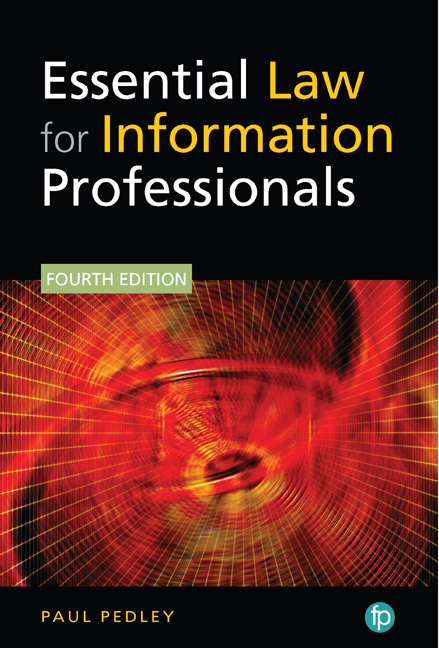Book contents
- Frontmatter
- Dedication
- Contents
- Disclaimer
- List of Figures and Tables
- Table of Statutes, Etc.
- Table of Cases
- Abbreviations
- Glossary of Terms
- Preface
- Chapter 1 General law and background
- Chapter 2 Library Law
- Chapter 3 Copyright
- Chapter 4 Legal Deposit
- Chapter 5 Breach of Confidence
- Chapter 6 Contracts and Licensing Agreements
- Chapter 7 Data Protection
- Chapter 8 Privacy
- Chapter 9 Freedom of Information
- Chapter 10 Human Rights
- Chapter 11 Re-use of Public Sector Information
- Chapter 12 Defamation
- Chapter 13 Professional Liability
- Chapter 14 Cybersecurity and Cybercrime
- Chapter 15 Disability Discrimination
- Chapter 16 Other Legal Issues Relevant to Librarians
- References
- Appendix 1 Brexit and the Orphan Works Exception
- Appendix 2 CILIP'S Ethical Framework
- Index
Chapter 5 - Breach of Confidence
Published online by Cambridge University Press: 27 March 2020
- Frontmatter
- Dedication
- Contents
- Disclaimer
- List of Figures and Tables
- Table of Statutes, Etc.
- Table of Cases
- Abbreviations
- Glossary of Terms
- Preface
- Chapter 1 General law and background
- Chapter 2 Library Law
- Chapter 3 Copyright
- Chapter 4 Legal Deposit
- Chapter 5 Breach of Confidence
- Chapter 6 Contracts and Licensing Agreements
- Chapter 7 Data Protection
- Chapter 8 Privacy
- Chapter 9 Freedom of Information
- Chapter 10 Human Rights
- Chapter 11 Re-use of Public Sector Information
- Chapter 12 Defamation
- Chapter 13 Professional Liability
- Chapter 14 Cybersecurity and Cybercrime
- Chapter 15 Disability Discrimination
- Chapter 16 Other Legal Issues Relevant to Librarians
- References
- Appendix 1 Brexit and the Orphan Works Exception
- Appendix 2 CILIP'S Ethical Framework
- Index
Summary
General principles
The common law tort of breach of confidence deals with unauthorised use or disclosure of certain types of information and provides protection for that information to be kept secret. This branch of the law is based upon the principle that a person who has obtained information in confidence should not take unfair advantage of it. The main means used to achieve this is the interim injunction (interdict in Scotland), which is an order of the court directing a party to refrain from disclosing the confidential information. A document may be considered confidential where there is:
• An obligation of non-disclosure within a particular document.
• A duty in certain papers involving professional relationships.
• A duty of confidence, which arises where a reasonable individual may determine that a document contains confidential material.
Breach of confidence is most commonly used to prevent publication of private material. The law protects confidential information from unauthorised disclosure and an injunction may be granted unless you can show that the publication is in the public interest, usually by exposing some wrongdoing. The injunction can in extreme circumstances be against the whole world, such as the injunction granted to protect the new identities of the killers of James Bulger.
In the James Bulger case, Dame Elizabeth Butler-Sloss gave the killers of James Bulger the right to privacy throughout their life. The media were already prevented from publishing their identities as a result of information obtained from those who owed the pair a duty of confidence, such as police officers and probation service officials. But Dame Elizabeth went further and said the pair had an absolute right to privacy. In another legal case from May 2003, the child killer Mary Bell and her daughter won a high court injunction guaranteeing them lifelong anonymity.
There are three elements of a breach of confidence. In Coco v. Clark [1969] RPC 41, Mr Justice Megarry said:
1 The information must have ‘the necessary quality of confidence’ – namely, it must not be something which is public property and public knowledge.
2 The information must have been imparted in circumstances imposing an obligation of confidence.
3 There must be an unauthorised use of that information to the detriment of the party communicating it.
- Type
- Chapter
- Information
- Essential Law for Information Professionals , pp. 107 - 114Publisher: FacetPrint publication year: 2019



